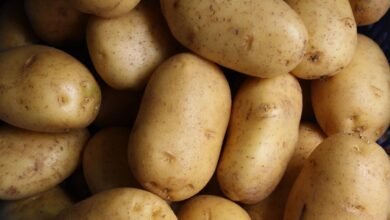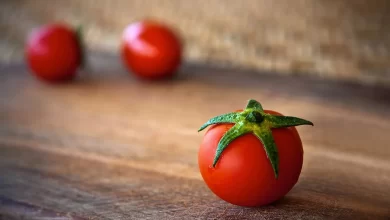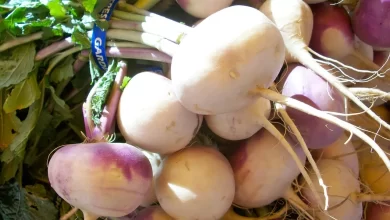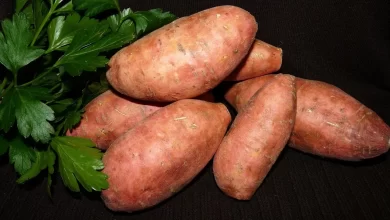Apple is one of the most favorite and healthy fruit among all other fruits. It is the most widely grown species in the genus malus. The tree originated in Central Asia, where its wild ancestor, Malus sieversii, is still found and grown. The fruit is been grown for thousands of years on the Asian, European continents. It was brought to North America by European colonists in the year 1607.
- The origin of apples traces back to the Middle East over 4,000 years ago.
- If you plant an apple seed, then the new tree will bear apples that are completely different from the one that was seeded.
- Apples are part of the rose family. The other fruits that include in this plant family are pears, quinces, medlars, apricots, loquats, almonds, peaches, plums, cherries, strawberries, blackberries, raspberries, sloes.
- On average, an apple weighing 150g needs 125 liters of water to produce. Taking a step further to make one apple, 200 ml glass of apple juice needs around 230 liters of water.
- There is a phobia or fear of eating apples is called Malusdomesticaphobia.
- Breaking down the world Malus and Domestica is the scientific name of an orchard apple tree.
- In several ancient cultures, the apple is viewed as a feminine symbol and found a resemblance between the two halves of a vertically cut apple to the female genital system. Alternatively, when an apple is cut horizontally, it resembles a pentagram which is considered key in revealing knowledge of evil and good.
- Apples contain a compound called amygdalin in their seeds, which is a cyanide-and-sugar-based molecule. Symptoms of cyanide poisoning can lead to stomach cramps, nausea, headaches, vomiting and can culminate in cardiac arrest, respiratory failure, or even death.
- 4% of apples is made up of minerals and vitamins, and over 80% is made up of water.
- Minerals that are present in Apples are calcium, potassium, and phosphorus.
- Apples are high in fiber, contain vitamin C, are low in calories, have a little trace of sodium, have no fat or cholesterol.
- Apples also contain polyphenols, which function as antioxidants to our body.
- Eating 11 pounds (approx. 5kg) of apples will make you gain only one pound (0.5 kg) of weight.
- A conventionally grown apple may be sprayed up to 16 times with over 30 different chemicals. Apples are also waxed, due to which pesticides are trapped underneath.
- The wax applied on apples is a natural one and is applied to make it shinier and helps it to last long.
- China is the biggest producer of apples worldwide and produced 41 million metric tons of the fruit in 2019. The second-largest producer is the European Union, with 11.48 metric tons of apples produced.
- There are over 7500 varieties of apples grown worldwide, out of which 2500 varieties are grown in the United States.
- A medium-sized apple contains 95 calories, 0 grams of fat, 1 gram protein, 25 grams of carbohydrates, 19 grams of sugar, and 3grams of fiber.
- The science of apple growing is called pomology.
- When grown, Apple trees take four to five years to produce their first fruit.
- An average apple tree can grow 30 feet tall and can last up to 100 years.
- The heaviest apple on record weighed 1.849 kg (4 lb1oz) and was grown and picked by Chisato Iwasaki at his apple farm in Hirosaki City, Japan.
- China is the biggest consumer of this juicy fruit, with 40 million tones.
- In the year 2020, the Global apple market reached $78.8 Billion.
- There is a popular saying an apple a day keeps the doctor away. This is said because the fruit contains powerful flavonoids, antioxidants, minerals, vitamins, and phytochemicals that help fight various diseases.
- The soluble fiber present in apples is known as pectin. It has multiple health benefits, some of which are: Improve Gut health, aid weight loss, Control blood sugars, aid heart health, helps in conditions like diarrhea and constipation, enhance blood iron absorption and strengthen hair and skin.
- A study suggests that having apple juice can actually improve your memory by preventing the decline of an essential neurotransmitter known as acetylcholine.
- Apples can float in the water as it consists of 25% air in it.
- A major scientific milestone was achieved when the whole genome of apples was decoded in the year 2010. Because of its genome decoding, many facts came to light. One of them is that it underwent duplication around 50 million years ago.
- Sekai Ichi Apples is the most expensive variety of apples. It costs around the US $21 for a 907-gram apple. Sekai Ichi Apples is a Japanese “world meaning world no 1”.
- Apple is the third most widely grown fruit after bananas and watermelon. In the year 2018, 86.14 million metric tons of apples were produced.
- The fruit rips 4 to 5 times faster at room temperature than in the refrigerator.
- A mature dwarf apple tree will generally produce 3 to 6 bushels of fruit. One bushel is equal to 42 pounds (20 kg). A semidwarf tree will produce 6 to 10 bushels of apples which counts.
- Eating apples helps to whiten your teeth naturally. This is due to the presence of malic acid, which is the same chemical used in teeth whitening products.
Nutrition Facts of Apple
Here are the nutrition facts for about one Apple.
- Energy (calories): 94.6
- Carbohydrate:25.1, including 18.9 g of sugar
- Fiber4.4 grams
- Calcium: 10.9 grams
- Phosphorus: 20 mg
- Magnesium: 9.1 mg
- Potassium: 195 mg
- Vitamin C: 8.37 mg
- Folate: 5.46 mcg
- Choline: 6.19
- Beta-carotene: 49.1 mcg
- Lutein and zeaxanthin:52.8 mcg
- Vitamin K: 4 mcg
References
- Wikipedia-Apple
- Britannica-Apple Fruit tree
- Theguardian.com(how dangerous is cyanide)
- Hsph.harvard.edu(a medium sized apple contains)
- fruitgrowersnews.com
- Webmd.com(apple juice help in improving memory)
- Healthline.com(pectin health benefits)
- Medicalnewstoday.com






